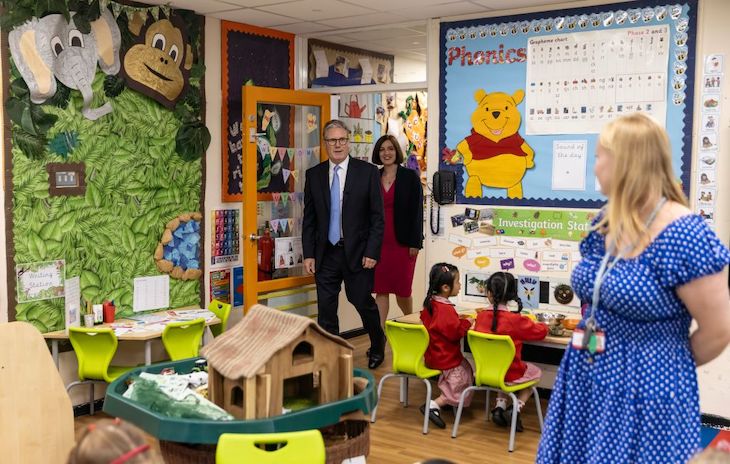Wales has long been an embarrassment for any aspiring Labour education secretary. While the Conservative government’s school reforms shot England up the international league tables – in the PISA rankings it rose from 25th to 13th in reading and 27th to 11th in maths between 2009 and 2022 – performance in Labour-run Wales and in SNP-run Scotland has declined.
Labour has always been the enemy of excellence – which it wrongly confuses with elitism
These three UK nations provided a perfect real-time experiment with which to assess the merits of different education philosophies. The tried-and-tested methods of phonics, a knowledge-rich curriculum and firm behavioural policies won decisively.
Simultaneously, the pioneering Free Schools and Academies programme – the foundations of which were laid at Policy Exchange – created pioneering test-beds within the English state-school system. Free Schools such as Michaela in Wembley or the West London Free School, and academy trusts such as Outward Grange and Inspiration Trust, showed up coasting comprehensives by consistently delivering outstanding results for some of the most disadvantaged pupils in the country. If one looks at the 20 state secondary schools with the highest Progress 8 in the country – a measure of how much pupils have improved between entry and GCSE – almost all embrace high standards and reject the soft bigotry of low expectations.
Many of these schools’ innovations and methods have since been adopted by the wider state sector. The then education secretary Michael Gove understood that outstanding performance could not simply be dictated by ministers from the centre, but required a system that would incentivise and sustain it: a system founded upon school autonomy, parental choice and strong accountability.
In her three-fronted war on academy freedoms, independent schools and home education, Labour Education Secretary Bridget Phillipson is seeking to stamp out any spark of autonomy that might demonstrate the folly of her own reforms. The centrepiece of her reforms is Labour’s Curriculum Review, which is being drawn up by a committee headed by an academic who co-authored a paper arguing that setting children by ability is ‘symbolic violence’ and criticised the Blair government for its supposed ‘obsession with academic achievement’. In the name of ‘diversity and inclusion’ Labour is seeking to dumb down the academic rigour injected by Michael Gove and Nick Gibb, replacing it with “a curriculum that reflects the issues and diversities of our society.”
What might this look like in practice? The teaching and headteachers unions have attacked the current curriculum as not having enough emphasis on “ethnicity and sexual orientation” and have called for “embedded anti-racist and decolonised approaches”, and for diverse reading material to “subvert racial biases.” This is despite polling for Policy Exchange for our Portrait of Modern Britain report finding that 72 per cent of the population believed “Children raised in Britain should learn to be proud of their heritage” – with net positive agreement from every ethnic minority group polled.
The unions have also argued that the push for high standards in English and Maths are “impacting on attendance and behaviour”.
Phillipson, for all of her faults, is no fool. She knows that many good schools and parents would want nothing to do with such a politicised and dumbed-down curriculum. Accordingly, she has introduced the Children’s Wellbeing and Schools Bill to force academies to teach it, while simultaneously imposing VAT on independent schools to drive more children back into the state sector.
Almost nowhere in the Western world taxes education. Yet Phillipson has repeatedly referred to the lack of taxation on private education as a ‘luxury’ – failing to recognise the natural desire of all parents to do the best they can for their children’s education and well-being. Could her rhetoric be paving the way for increasing the tax levied still further?
Labour has always been the enemy of excellence – which it wrongly confuses with elitism. The 1960s and 70s saw the closure of grammar schools and, even more damagingly, the ‘progressive’ onslaught on grammar, phonics and writing standards that betrayed an entire generation. The year 1997 saw the end of the assisted places scheme – which sent poor, gifted children to top private schools – and the phasing out of dedicated funding for Oxbridge. It should be no surprise that 2024 has ushered in a tax on educational aspiration alongside the fettering of our top state schools.
The assault on excellence is not only harmful, but deeply misguided on its own terms. Shakespeare, the Magna Carta and calculus are the birthright of every child, regardless of race, religion or class. This has been repeatedly proven by our top state schools, some of which now send more pupils to Oxbridge each year than Eton. Yet Labour believes that tall poppies should be lopped off – exemplified by last month’s mid-year axing of the Latin Excellence Programme for state schools. As in all such culls, it is always the disadvantaged who suffer most.
Phillipson believes that she knows best how to run schools. Yet she is ignoring the results and best-practice of the outstanding headteachers who have driven up standards across England.
Under Phillipson’s plans, there will be no escape routes for bright, aspirational children who seek to ‘rise above their station.’ No free schools or academies with the freedom to expose the intellectual paucity of her curriculum, fewer bursaries for poor children to attend private schools, home-educating parents harassed back into the state system that has failed them. A one-size-fits-all approach, in which the best of our schools are levelled down to meet a poverty of aspiration.
England’s schools’ educational performance stands as a personal affront to Labour, showing up the inadequacy of ‘progressive’ approaches at both country and school level. Rather than seek to build on it, Phillipson would rather tear it down in a futile attempt to hide the bankruptcy of her own policies. The biggest tragedy is the children from hard-working families who will lose out as a result.







Comments